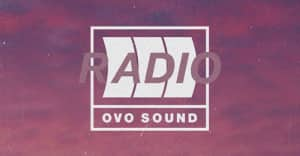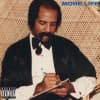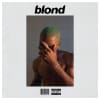 Sarah Doyle
Sarah Doyle
Dublin singer-songwriter James Vincent McMorrow is maybe not the first person you'd expect to take up refuge in the OVO camp, but he's definitely worked his way in there. In the past year, he had a vocal credit on Drake's "Hype" from Views and had a few credits on the dvsn record, as well. It's mostly due to a friendship and working relationship with GEN F alum Nineteen85, who steered McMorrow's excellent new record, called We Move.
On the album, which is out September 2, McMorrow worked with some of Toronto's brightest minds, namely Nineteen85 and Frank Dukes, to make an album that feels like extremely new territory for the singer. The hallmark, whispy vocals from his earlier work have been replaced with a more commanding voice. The album's first single, "Rising Water," is a menacing pop record, perfect for a drive in L.A., where a lot of the album was recorded. You can feel 85's influence in the track's minimalism. "They are just good people with great musical instincts, and they just want to make music," McMorrow says of working with Nineteen85 and Dukes.
The FADER spoke with James Vincent McMorrow over the phone from Dublin where he talked about the admirable "ruthlessness" of OVO's world, what it's like to find ideal musical collaborators, and what he hopes people think about his new sound.
Where did you record this album, how did it come together?
JAMES VINCENT MCMORROW: I was getting a lot of requests to do work with other people, [and] I tend to turn that stuff down — to be honest, it was never something that I'm very comfortable with. It's not that I'm snobbish about it, I'm just not very good in rooms with other people writing songs. So I just thought I would start writing some ideas on the bus that I would eventually pass off to other people. Then I met Nineteen85 when we were in Toronto [on tour], and we got on really well. We started talking about doing something, and I realized that it was sort of my thing that I was working on. Because I'd been writing [songs] for other people in mind, I wasn't being as precious about it; I was being a little bit more forthright with it, and doing things that I would want to hear more than hawking myself out. So that's where it came from, and then it kind of worked out. I toured for a year then maybe October of last year, went to back to Toronto and hung out with 85 and Frank [Dukes] there, and got work done. I was in L.A. for maybe six months as well, just living, just trying to see another part of the world and see how that would inform the work. I've always been fascinated by L.A., I find it the strangest place. I just kind of wanted to live in a place like that for a while, where everybody is so healthy and so earnest and pure and also really not at all; it fascinated me. So I wanted to kind of immerse myself in some of their aspects of life for a while and see what would happen.
That's so different from the previous record, where you were in seclusion in Mexico.
I think the word seclusion tends to get put to the forefront. It's never like "oh shit, I need to be in the woods" or some shit, I end up in places like that because I'm fascinated by the spots. Like the place was in Texas, it was right on the border near El Paso. I just liked the studio, thought it was a really bizarre place. The guy that owned it was really compelling to me. [He is] kind of a quirky guy, real music dude, he put so much money in this place, and it's an such an obscure spot. So I've always gone to those types of places because I like the idea of them and then they happen to be private. And I've always worked by myself, but with this record it was like time to let other people into the process — and that meant going to them. So you know, 85 was in L.A. a lot, so I was there, and then he was in Toronto, so I was there. I kind of went where people needed me to be, rather than sequestering myself off somewhere by myself and just playing piano for five weeks in silence.
Can you talk about meeting Nineteen85 and why you made such a good pair working together?
We talked about doing stuff initially when he came to a show I played in Toronto. It was a really intense tour, we'd had a lot of dramatic stuff go on — my drummer's uncle had passed away the day of the show — and everyone was very subdued backstage, even though it was the biggest thing we'd done in Toronto. It was really exciting but also really emotional, [and in our] tiny dressing room, everyone was sweaty and gross. And then 85 came backstage with some of his friends and managers, and they're all so slick-looking. When you see anybody from the OVO crew, you just know them automatically because they look cooler than anybody else in the room. We were hanging out — it was very lowkey — and we didn't gel automatically because it was just an alien situation for it. [Afterwards] we just talked a lot back and forth on email. Everybody that knows me knows that my love [for music] was from hip-hop, and sort of that production background. I've never necessarily put that into a record before because it's hard to explain where I come from musically to people, like I grew up loving singer-songwriters but I [wanted to] find a way to make singer-songwriter music not just with a guitar and with a piano. [85 and I] talked on email and I realized that you could talk to him as easily about a Tool album as '90s R&B. The guy grew up listening to the exact same type of music [as me] and sort of wanting the same career. I think we're just really on the same page and we kind of think about music exactly the same way. So it was really enlightening — it was not what I was expecting because I was familiar with him through the Drake stuff, and [that's] all so polished and so aloof to me almost.
We were working on a song on my record once, where he was like, "This sounds like track five off the first Silverchair album," and I was like, "What the fuck are you talking about, that's such an obscure reference." And we listened to the track five off the Silverchair album and the guitar tone was almost identical. It was that level of ridiculous musical knowledge; that's why we get on so well. But that's his genius, that's 85's brain, he has this breadth of knowledge that you don't find very often. I find that more often in people that work in R&B and hip-hop and that type of production world because I think they grow up and have to be adaptable, whereas I've worked with indie musicians and indie producers before and the frame is very narrow. I like Pavement, and I could talk about Pavement records, but I couldn't talk about Pavement records with as much passion as I could talk about a Jodeci record. We just have a similar mindset. We're kind of like the same person when we're in the room together working, we kind of have the same instincts all the time.
You said, "anyone who knows me knows my musical background." I felt like that got interjected into this record. How did you embrace that?
I think a lot of that had to do with bringing in outside voices. I think when you're the only person in the room, you can talk yourself out of as many things as you can talk yourself into. That's always been my greatest flaw as a musician. I look back on my first records and think, why didn't I do that, why didn't I be more, why wasn't I more bolder or braver? And it's like well, you know, it's all part of this learning thing and I've always just talked myself out of the idea. There's a version of my first record that is all electronic drums and all very built off a Korg Triton, because that was the keyboard that I had. So everything was built out of that, and then I panicked a little bit, because I just didn't feel secure enough or whatever, so I would just kind of walk myself back from the edge and put in these other sounds.
This is the first record where I just like, okay, we're just gonna do whatever feels right. I'm not gonna question it, I'm not gonna think about it beyond knowing that I love it. If it was something we were sitting in a room [listening to] and I was like, "Yeah, that right there is exactly what I want to hear right now," we wouldn't go, okay, [add] 200 more layers, which was what I did on my [other] records. The greatest adage that 85 [said], which I think he took from 40, was like, "Don't try and live out your dreams on every song," and that's something we would always talk about — let's not impress ourselves in the studio. Let's not sit there and go okay, how many drums can we fit on top of that pattern, how many sixteenth hi-hat notes can we fit in the beat that clash against that, all the kind of the stuff that would've taken up so much time in the past. We were like, let's just set all that aside. And if we have something that we both love, let's embrace that and not question it.
Are you nervous for any reaction to the changing of your sound?
No. In an ideal world, everyone would love something, but that's never gonna be the case so you can't really concern yourselves with it as much — you have to just be committed and stand behind it. I think I'm lucky; I think that the last record I made, there was enough of a nod towards what's happening now. Because, for me, this is the closest to a singer-songwriter album that I've ever made in the most traditional sense. I know that sounds strange because of the production, but I think when you break down these songs, they are the most straightforward, simple, plain-spoken songs I've ever written. I wasn't trying to wrap stuff up in atmosphere or in metaphor, I was just trying to say things. I think that's the beating heart of this record and production is just an aesthetic choice, it's not the defining thing of a song to me. It's just, that's the production I love, and if people hear it and they're scared by it, that's okay, it's not gonna be for everybody. It's 2016 and so much has changed in music in the last four or five years. The acceptance of doing something like this is way more palpable now.
I think even my first record, it was off the back off MySpace and everyone was like, "Okay, you need to pick the three genres that you are," and it was like, how was I fucking supposed to do that? That's crazy. So you end up with this sort of indie, alt, folk whatever, R&B thing, whereas now it just doesn't feel that way. I've always believed that there's good music and bad music; I'm the same as 85 in that respect. I don't not listen to something because that's not the type of music I listen to, I just love a great song and I think that people will get that, that's my hope. And if people don't, then I'm not gonna get mad, I'm not gonna be sitting around trying to explain it to them, because I've tried to do that in the past, I've tried to walk people through it, and it's kind of futile, people will get it or they won't get it, and all we can do is kind of present it in the right way.
You're singing in a much fuller voice on this album, it's more to the forefront.
I completely agree. I think that's a confidence thing, it's weird. I was reading the Sampha cover story — I love Sampha, he's such a good human being — and I think he said something really similar to this, so I'm not gonna try and steal his quote, but it was definitely clickable. He was saying that when you make your first record, reverb is your friend. Because reverb hides the flaws and if you're scared of putting your voice out there you put reverb on it and you just blend it into the track and you don't have to worry. I remember when I was making my songs, in the beginning, everyone would just be like, "You have to turn your voice up," and I would refuse. But over the last four or five years, my voice has just gotten further and further to the front. On the second record, I kind of made decisions on certain songs to make my voice almost the background because I wanted it to be production. Whereas on this one, these are songs and these are lyrics and I want people to hear them — you can't do that if your voice is thrown in the back with a ton of reverb on it. So I think it's a coupling of the confidence thing and also I'm saying things that mean more to me. I can't expect people to go and read the lyrics and understand it, I want people to hear it as soon as they hear it.
With working on dvsn's album and having a vocal on the Drake album, you're pretty in the OVO sphere of things. Can you speak to that at all? There's Nineteen85, but maybe there's more.
There is and there isn't more. I think that my relationship with 85 obviously led to both of those things — he was the one that produced the Drake song, he was the one that put the vocals in there. The thing with Drake and the thing with 40, and what makes them so brilliant, is that they understand how to curate better than anybody I've ever met. They understand aesthetically what they're doing at all times, so if they feel like they have a void in the song or a hole or something, they open it up to the floor and they say, what have you got? And I think that's how that came together together, I had these things that I was working on with 85, and they came to him one day and said we have a song, we need vocals and he happened to have those on hand that day, so that was through him and it was just a really lucky happenstance, but it all stems from the same well.
I get on really well with all of those people. Even before I met them, I had more respect for them than I probably do for most people that work in and around music, just because of the way they accord themselves, they always seem like they know what they're doing, and they've always been very respectful, in my mind, but mainly they're kind of also ruthless if that makes any sense. Respectful, but also ruthlessly respectful; they do what they need to and it always works, and I think that that resonates with me. The world comes to [Drake and 40], rather than them coming to the world; everybody's coming to Toronto and that fascinated me before I met them. The fact that we got on so well and that I was able to work on all those different records was just fortunate, really, and speaks to their collaborative nature. I didn't lobby to be on the Drake record, I never even mentioned it, and the dvsn thing, again, I had this version of an Elliott Smith song that I'd been playing live, and 85 heard it by mistake. I was singing it at the end of vocal stem that I sent to him one day, and he rang me and was like, "What is this?" He never heard the song, and two days later, we sort of turned into the dvsn song, and so there's just a lovely sort of collaborative nature to them as well as all of their upper echelon stuff; they know how to work and I respect that. It's really inspiring being around [the OVO guys].
On "Rising Waters," specifically, is there any moment in the recording of that that really stands out to you?
I think it was when 85 muted off maybe 70% of the stuff I recorded. That was the thing I kind of alluded to earlier, the idea of being open to anything. My instincts going into this album, like every album, was to throw every idea I have at the wall. I always come with a lot of ideas — I come with all the drum patterns, I come with all of the guitar lines, all of the synth lines, everything. Historically what's happened is I've then spent six months in the studio coaxing everything into place, and if I have to erase stuff or mute it off I will, but I fall into that trap of wanting to live out all my musical dreams every single time. As I said, 85 comes from a different perspective, so did Frank, and so did Ben, who worked on this album. With "Rising Water," the first day in the studio, 85 muted off 70% of what I did, and we just left it with the drums and the bass. I recorded the vocals on top and we were like, okay, that doesn't feel wrong, so let's not overthink it, and that song, more than any on the record, was a revelatory experience. It was like okay, this is totally different to how I envisioned this song being, but it's also so much better.
I think we all kind of looked at each other in the studio that day, and were like, this is actually happening. We'd been working on the album for a week at that point, and we'd gone through three to four songs, and it was all sort of as we'd expected it to go, and that was the first one where it was like, okay wait, that's taken a real left turn, and it was infinitely better than what I had brought to the table. That was good for me as well, because I still have a precious instinct to defend what I bring to the table, and if you tried and mute off the snare drum, in the past I would've fought you, and been like, why? Why can't we use that snare? 85 was like, just get it gone and if we miss it, we'll bring it back. And on that song, we never missed it. We just were like, okay, this is minimal, and it goes, and let's just embrace that. When you listen to it first it's a strange mix but that's what I love about it, it was so unorthodox so that was a real revelatory thing for both of us.


